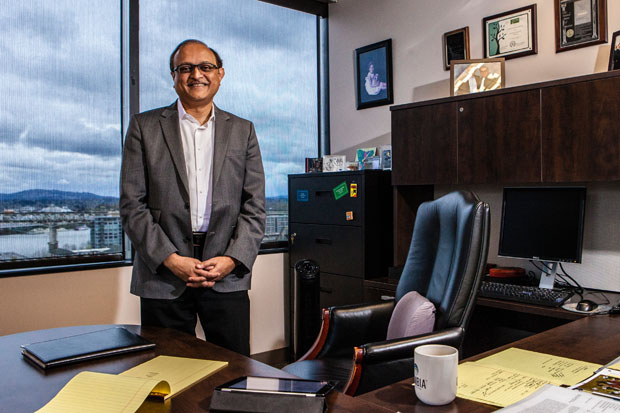BY LINDA BAKER
Mohan Nair channels a visionary.
BY LINDA BAKER
Mohan Nair channels a visionary

It’s tough to quote Gandhi, or Gandhi-isms, without sounding cliché. But if anyone can pull it off, it’s Mohan Nair. The chief innovation officer at Cambia Health Solutions is not only named after the famous peace/change maker Mohandas Karamchand Gandhi — better known as Mahatma — but he also spends his days trying to transform one of the largest, most change resistant bureaucracies in the United States: the American health care system.
“We want to create and be the example we expect everyone in health care to be,” says Nair, sitting in his downtown Portland office on a recent Monday afternoon. His voice drops a notch, tinged with meta-mockery. “Be the change you want to see in the world.”
Nair joined Cambia (formerly the Regence Group) 11 years ago as chief marketing officer. In 2011, Regence rebranded as Cambia, a holding company that today consists of six insurance plans and 21 “health solutions” startups such as SpendWell, an online health care marketplace, and WarriorWell, a training program for soldiers and their families.
The rebrand coincided with Nair’s new position, which Cambia CEO Mark Ganz created as a way to give the company more of a consumer focus. The head of a fourteen person team known as “Innovation Force,” Nair is charged with designing, creating and launching new retail oriented companies and products. The group also works on solutions to problems within its internal divisions and companies.
If this all sounds vaguely familiar, it’s because Innovation Force is part of a larger trend in which legacy companies in all sectors, eager to maintain relevancy in a rapidly changing world, are now spinning off startup companies and accelerators. Wells Fargo, for example, launched an accelerator for financial services tech innovators.
Nair, unsurprisingly, says Cambia is on the bleeding edge of that trend. “A lot of companies buy innovation. They say: ‘Let’s get smart people in the room and make it happen.’ My role is to focus the organization on innovation as a value. It’s about what everyone does: every employee, as well as a community of customers. It’s a different story, different challenge and it’s a lot more exciting.”
The son of Indian émigrés who grew up in Singapore, Nair is affable, animated and a natural born storyteller, mixing marketing speak with the authority, passion and humor of lived experience. The day he met with Oregon Business was the day Lee Kuan Yew, the founder of modern Singapore, died, and Nair said his passing gave him cause for reflection.
Mohan |
“All my life I watched him lead through a crisis of transformation, a small city state, rattled by the Japanese, then the British and the Malaysians. Now it’s the richest city state in the world. I served in the military there. I am a loving and caring citizen of the U.S. But I still have roots in what it is to be in a nation that is transforming. It was a lesson.”
Founded in 1941, Regence began its market transformation about 10 years ago, before the rebranding. Acting as Cambia’s internal change agent, Innovation Force seeks to speed up the process. The team seeks out ideas for products and companies — not just from the “elites,” Nair says, but directly from Cambia’s rank and file.
His group is currently reviewing 1,500 ideas generated by around 800 people throughout the company: customer service, compliance, audit management. “You would think the product management or engineering team would be pumping out ideas,” Nair says. “But they do that regularly. The other people are more excited. It’s wonderful to see.”
Not that it’s an easy task encouraging 5,000 employees, most of whom have spent their work lives complying with insurance rules, to think outside the box. “But that culture change is what I am responsible for,” says Nair, whose staff offers coaching and guidance. “We think if we continually engage the person, we can create the golden goose.”
In the past four years, the process has yielded three golden eggs: Wellero, a streamlined payment system; Muse, a psychology treatment app and ReformForMe, a simulator for employers to model recent reform impacts.
Others ideas are more operational. An employee-led effort to streamline Blue Card, a program that allows users to access health care services around the world, cut millions of dollars from the service in less than two months. “We’re not an R&D lab,” Nair says. “We don’t take a highbrow view of innovation.”
In 2014, Cambia invested $14.35 million in its health care startups. The long term goal, Nair says, is to build a “community of health” combining consumer controlled “weapons of health” — food, sleep, physical activity — with the current system of illness management. “Innovation is about the entire story and we don’t have the narrative yet. The consumer has to help us.”
For all his populist rhetoric, Nair doesn’t eschew advice from the top. Photographs of Nair with prominent business and political figures, Bill Clinton, George Bush senior, Donald Trump, dot his bookshelf. A computer scientist by training who worked for Intel and Mentor Graphics, Nair says the health care industry needs to borrow a page from Steve Jobs, who highlighted the value of good design in solving problems. “He also understood that innovation is about the want as well as the need. What Apple did in delighting and raising our consciousness is our new bar for how the consumer performs with the marketplace.”
Nair sets another, higher bar. He recounts a story about meeting Gandhi’s grandson, Rajmohan Gandhi, when the latter gave a speech at PSU about 15 years ago. The two men went out for dinner, and, says Nair, “the first question he asked, was: ‘So Mohan, what do you do for the world?’ I was flabbergasted. Picture me talking without any meaning trying to justify myself. I even went as low to say I create jobs, one of the lowest things you can do when you talk about what you can do for the world.
“He meant the question in an epic way. And I didn’t have an answer. So that became my search. Health care is one of the biggest challenges in the world and we are taking it on.” But can one relatively small health care insurance-turned-solutions company really change the way Americans use and purchase health care?
“Say that to Gandhi — you know I’m going to go there — say that to Mother Theresa,” responds Nair. “Say that to anyone who has reformed the world.” {jcomments on}



